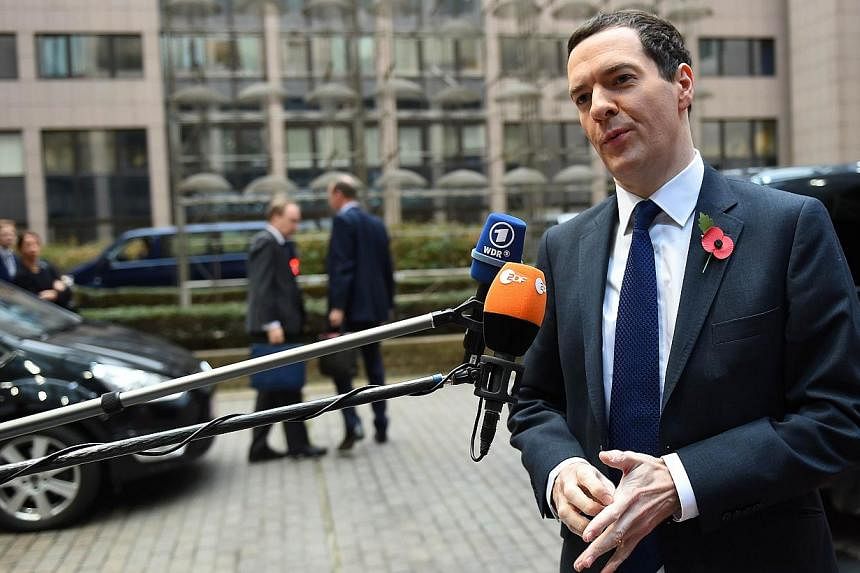BRUSSELS (AFP) - Britain claimed victory after EU finance ministers agreed Friday to extend a deadline for a huge €2.1 billion (S$3.37 billion) bill until next year, but walked straight into another row over its claims to have reduced the amount.
Britain's finance minister George Osborne said the bill had been "halved", and that instead of a Dec 1 cut-off, Britain would now pay the remaining amount in two instalments before September 2015.
The deal is a boost for Prime Minister David Cameron, who faces a general election in May and has promised a referendum in 2017 on Britain's membership in the European Union if he wins.
But other European ministers insisted that Britain would still have to pay the full amount eventually, while Cameron's eurosceptic political opponents accused him of fiddling the figures to present a loss as a win.
"Instead of footing the bill, we have halved the bill, we have delayed the bill, we will pay no interest on the bill," Osborne told reporters after the meeting with his counterparts in Brussels.
"This is far beyond what anyone expected us to achieve, and it's a result for Britain."
The original bill was based on a recalculation of member states' budgets dating back over several years, and Cameron had refused to pay either the full amount or meet the original deadline.
France and Germany were set for large payouts under the new rules, a factor that had further angered Britain, which said it was being punished for its economic recovery in recent years.
The Netherlands and Italy also face bills worth hundreds of millions of euros.
Osborne said that Britain would only meet half the original bill, paying a total of £850 million (S$1.7 billion) in two instalments in July and September next year.
He said the rest would be offset against a full upfront payment of the £3 billion annual rebate negotiated by British premier Margaret Thatcher in the 1980s.
Cameron was quick to hail the deal as a win, with his Conservative party facing intense pressure from the eurosceptic UK Independence Party ahead of next year's elections.
"I said we wouldn't pay £1.7bn on December 1st. We've now halved the bill and will pay nothing until next July. We're delivering for Britain," he wrote on Twitter.
The British position received some backing from EU budget commissioner Kristalina Georgieva, who said Osborne's claim was "factually correct" and said the amount of the two instalments would together be about one billion euros.
But other EU ministers challenged the British claims of a big win, saying that London still effectively had to pay up.
"My understanding is that the UK will have to pay the whole amount," Irish Finance Minister Michael Noonan said.
Asked about Osborne's figure he said: "I don't know what the basis of that calculation is."
German finance minister Wolfgang Schaeuble said when asked if the ministers had agreed at the meeting to reduce Britain's payment: "We did not talk about that."
An EU source added: "The amount isn't changed. The British claim is mixing the amount with the rebate."
In Britain, UKIP leader Nigel Farage, whose party stole its first parliamentary seat off the Conservatives last month, tore into his rivals on Twitter.
"Osborne trying to spin his way out of disaster. UK still paying full £1.7bn, his credibility is about to nose dive," Farage wrote.
The row overshadowed new European Commission chief Jean-Claude Juncker's first week in office, with Juncker accusing Cameron of having a "problem" with other leaders after the British premier brought it up at the October summit.
EU officials have said they are keen to keep Britain in the 28-nation bloc, but there are increasing signs that they are tiring of his demands, which also include limits on immigration.
German Chancellor Angela Merkel reportedly said that immigration curbs sought by Britain are a "red line".
"He is unbearable," one European diplomat told AFP of Cameron after the British leader's comments on the budget bill following last month's summit.

